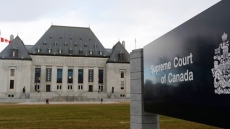OTTAWA — All but overlooked in the past week of troubling economic news was federal Finance Minister Joe Oliver's unexpected nod to government stimulus spending.
The run-up to an October general election is happening amid talk of recession, international downgrades of Canada's growth prospects, weak world oil prices and several grim provincial outlooks — stormy seas for an incumbent Conservative government seeking a fourth mandate after staking its reputation on sound economic management.
A Conservative re-election plan engineered in sunnier days when a return to balanced budgets could comfortably co-exist with voter-friendly spending bonanzas is now being repurposed as a recession-fighting necessity.
"What people should understand is that some of the measures which the prime minister announced and which I announced in the budget will inject almost $10 billion in cash into the economy this year," Oliver told reporters in Vancouver last Tuesday.
"The two primary sources of that cash input relate to the family benefits program and infrastructure spending. So that will have an impact, a positive impact on Canadian economic activity."
WHAT'S COMING?
Parents with children under 18 will start getting new benefit cheques — retroactive to Jan. 1 — on July 20, a one-time, pre-election burst of cash totalling more than $2.5 billion.
Conservative ministers and MPs, meanwhile, are announcing new community infrastructure projects virtually every day this summer from a variety of infrastructure funds — some of which have lain fallow for months awaiting the optimal pre-election moment for government-friendly announcements. Oliver's office says the government added more than $1.6 billion to existing infrastructure funding for 2015-16.

Economists, as is their way, are divided on whether the family benefit spending spree or the infrastructure dollars will have much economic impact this year.
But they all agree that with a new Conservative balanced budget law in place and an election looming, additional recession-fighting fiscal measures from the government are not in the cards before Canadians go to the polls in October.
"They're a little bit caught because they're basically making one of the big anchors of their election platform the return to a balanced budget," said Don Drummond, a former senior Finance Canada official who now teaches at Queen's University.
Mike Moffatt, who teaches economics at the University of Western Ontario's Ivey Business School and also serves as chief economist at the Mowat Centre, said last week's 1.2 per cent growth prediction for the year by TD Bank suggests a $3 billion loss in revenue from Oliver's April budget forecast, which was predicated on growth of 2.0 per cent.
STIMULATING CHEQUES?
Moffatt, who helped the Liberal party cost its family benefit package, believes this month's burst of retroactive government cheques will have a positive impact.
"I don't think the government thought we'd be in a recession in July: 'Let's make sure the cheques start flowing then!' That is a happy accident, and I think that is quite beneficial," said Moffatt.
"I don't think stimulus has to be more subtle than that."
Finn Poschman, vice-president of policy analysis at the C.D. Howe Institute, says the lump sum family benefits will certainly be welcome.

"But the economic evidence of using transfers — putting cash in hands of households — to stimulate economic activity is mixed. It's generally not negative, nor is it strongly positive."
Poschman, a self-described "market oriented" economist, dryly noted that, as long as the family cash infusion isn't funded through deficits, "the likelihood of it being harmless is much better than otherwise."
Drummond is equally cool to the idea.
There's "a pretty clear hierarchy" of what policy measures stimulate the economy, he said.
In fact, the Conservatives' own 2009 recession-fighting budget included a chart that showed the dollar-for-dollar GDP multipliers of seven different measures, with infrastructure spending the most beneficial. Personal and corporate income tax measures were at the bottom, with help for low-income households in the middle of the pack.
Drummond says some portion of any tax relief or transfer to individuals will be saved and some spent, while infrastructure dollars all go back directly into the economy.
Moreover, roughly a third of what families do spend goes toward imported items, mitigating the impact on the domestic market.
The family cheques will have some effect, said Drummond, "but not an awful lot."
INFRASTRUCTURE BENEFITS
He's more bullish on major infrastructure projects, which use Canadian labour and materials while providing longterm productivity benefits.
But Drummond notes that many of the projects currently being announced in the run-up to the election are smaller projects, such as community centres and hockey rinks.
"That gets the money spent and gets the concrete going, but that doesn't have the long-run economic benefits," said Drummond.
INTEREST RATE RELIEF

One measure outside the government's direct control is a move in interest rates.
The Bank of Canada is set to make a scheduled announcement Wednesday amid speculation its trend-setting rate could be cut in an effort to boost the economy.
But the bank's key rate, now at 0.75 per cent, is already at rock bottom, Drummond points out.
"If an interest rate of three quarters is not doing the trick, why would we believe an interest rate at a half would make any difference?" he asked.
"The only agents in the economy responding to lower interest rates are consumers and house buyers, and they're just racking up more debt."




